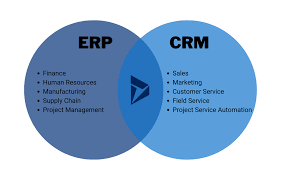ERP stands for “Enterprise Resource Planning.” ERP is a software or system that integrates functions, streamlines processes, and manages a business. An ERP stores all sales, warehouse, and accounting data in one system. ERP’s can solve communication challenges, can take over the roles of certain positions to manage workers’ time better, as well as track customer data and aid in decision making. CRM stands for “Customer Relationship Management.” CRMs can be utilized in marketing, sales, HR, accounting, and orders. CRMs allow for a more standardized way of dealing with tasks allowing for more clarity and productivity. CRM and ERP are both software that get work done more efficiently and effectively, but the key difference between CRM and ERP is that CRM is used more in the sales and customer service side of the business while ERP software is used more in finance and specific business processes. The benefits of utilizing the two software together can be shown by Amazon. 
Reader Interactions
Comments
Leave a Reply
You must be logged in to post a comment.
Hi Kristina! I really like your visual representation and the comparison between both ERP and CRM. It was hard for me to figure out the differences when first learning about these two systems but after comparing and contrasting the two, I definitely think I can now identify them separately and not mush them together. When really thinking about the software, I think that personally within the company I work for, they need a better enterprise resource planning system. I think that there are a lot of communication issues and a better management process to track data. A lot of things aren’t traceable or hard to recover and I think it could be the lack of an ERP system in the company. Obviously it’s one opinion but I think companies need to look more into their opinions of the employees since we are the ones doing the work and seeing the flaws!